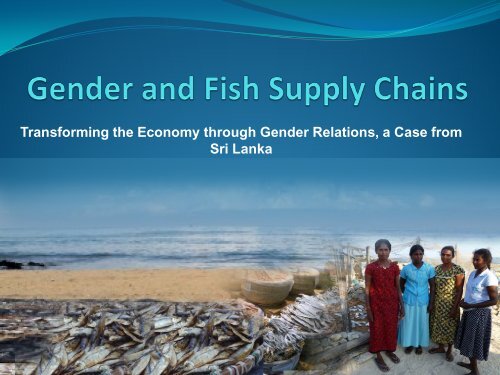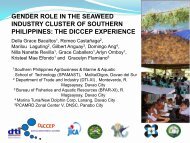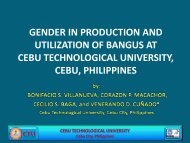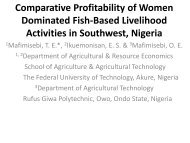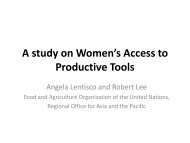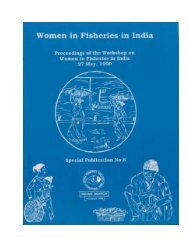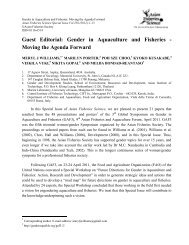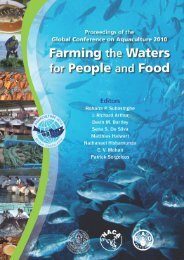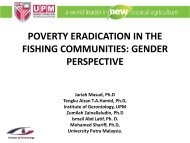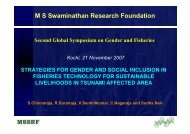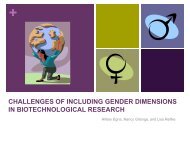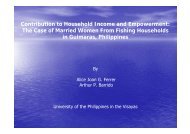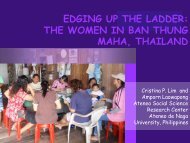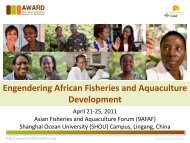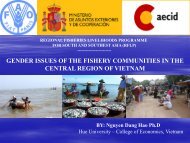You also want an ePaper? Increase the reach of your titles
YUMPU automatically turns print PDFs into web optimized ePapers that Google loves.
Transforming the Economy through Gender Relations, a Case fromSri Lanka
Thanks…toRFLP/FAO
Preamble• The Post Tsunami CoastalRehabilitation and ResourcesManagementProgram(PTCRRMP) funded by theInternational Fund forAgricultural Development(IFAD) has been implementing agender responsive microenterprises developmentprogram in the tsunami affectedareas of Sri Lanka.
Focus• PTCRRMP’s interventions todevelop 3000 gender basedmicro enterprises throughoutthe area• This is one of the locationidentified as the village ofThotamuna, a tsunamiaffected coastal village in theSouthern Sri Lanka.
Selection andServices of Project‣ Being Tsunami affected‣ Poverty group‣ 75% of women participation‣ Existing and growth potential‣ Cluster potential
ApproachTechnological ServicesprovidersMarketin ServicesprovidersRegulatory Agencies(DS,PS,Tax, CompanyRegistration)Monitoring &EvaluationMechanismAssociation of villages leveland district levelentrepreneursCreditInstitutionsDistrict /DivisionBased BanksOther BusinessDevelopment ServiceDistrict /National LevelBusiness ChambersBusinessCounseling &follow upserviceCapacityBuildingActivitiesFacilItationService ProviderFacilItation
The Case of Thotamuna• Thotamuna is a fishing village with a population of about 880 people.• The adult gender relationship in the village is 290 men to 590 women.• 189 persons died due to tsunami incident and 150 of them were female.
The Case of Thotamuna contd.,• The traditional economy in Thotamuna is based on a fish supply chain.• Fishing is the main source of household income
The Case of Thotamuna contd.,• Fishing generates the value chain• The daily fish stock is caught by men• A large portion of the fish stock is unprocessed and sold directly tomiddlemen.• The income generated through this business activity is not sufficient tocompensate for the well-being of the household.
• The household is managed by women• The social relationship between women andmen forms the basis for a gender-basedoverarching economic relationship in thevillage• It increases the well-being of the family
Women involvementfor PlanningEnterprise development plan(Business plan) preparation
Causes & effects of poor growth in micro enterprises in the VillagePovertyamong ruralcommunityPoor growth of micro & small scale enterprises
The Case of Thotamuna contd.,• The gender relationship opens-up the opportunity for reducing thepoverty level of the households in Thotamuna.• A large portion of the fish stock caught by men is directly sold tomiddlemen –in a traditional and difficult-to-break trade cycle• A small portion of it is sold to women in the village.
The Case of Thotamuna contd.,• The women in Thotamuna have a traditional skill and technology toprocess the fish into value added products such as Ambulthiyal, Jadi,Dried Fish and Umbalakada (Maldives Fish)• It brings the complementary income to the family and maintains thefamily’s food security.
The Unexploited Opportunity to ReducePoverty• The processed fish-based products of women have a great potential todevelop into multiple business value chains that benefit the localeconomy.• They have a high demand in the local market, urban supermarkets andin the markets abroad.• The processed fish based products quote high prices especially, in theup-market.
The Unexploited Opportunity to ReducePoverty Contd.,• There is the opportunity to increase the economy and household wellbeingof the village by undertaking a micro business developmentintervention on fish-based products manufactured by women.• Increasing the processed fish-based production will gradually reducethe fish stock going into the middleman at a lower price withoutcreating a conflict with the existing trade pattern.
The Unexploited Opportunity to ReducePoverty Contd.,• The existing primary trade pattern of the village can be replaced by aproduction economy based on a gender relationship.• Such production economy will add value through the involvement ofwomen to the stock of fish caught by men.• A gradual transition of the village economy engaging and increasingthe participation of women is foreseen.
Foreseen Outcome• A gender based fish production process will form a strong social andeconomic relationship between women and men in the village ofThotamuna• It will result in the increased household food security.
Conclusion• The gender-based micro enterprises development interventionfocusing on a fish based value chain is realistic• In a Cluster-based approach, gender relationship based value chainscan be developed within the village.• Products can be linked up with the urban and export markets thatwould create a number of value additions to the business relationships.
Conclusion Contd.,• Can create various income channels to the villagecommunity especially, the women population.Examples• Fish stock – processed primary products- furtherprocessing (quality improvement, productdevelopment etc.) within the village• Fish stock – processed primary products- furtherprocessing by external (perhaps large scale)enterprises• Fish stock –processing- packaging- brandingsalesto wholesalers• Fish stock –processing- packaging –brandingurbansupermarkets/international markets• Fish tock –processing-packaging –branding –sales to direct consumers through own outlet
asnayake.bandara@gmail.com


